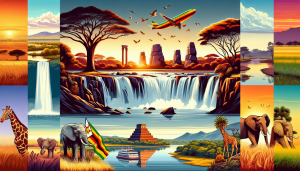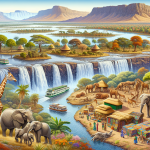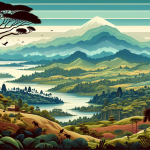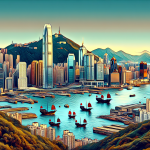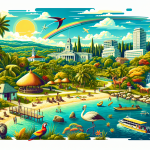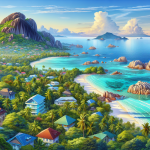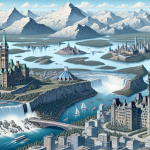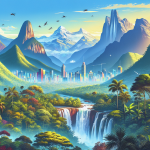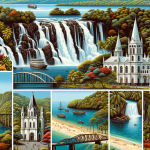Discovering the Wonders of Zimbabwe: A Traveler’s Guide
Zimbabwe, a landlocked country in Southern Africa, is a destination that often flies under the radar for many travelers. However, this gem of a country offers a plethora of experiences that are as diverse as its landscapes. From the thunderous roar of Victoria Falls to the serene beauty of its national parks, Zimbabwe is a country that promises adventure, culture, and unforgettable memories. This guide aims to uncover the many facets of Zimbabwe, offering insights into its rich history, vibrant culture, and stunning natural beauty. Whether you are a seasoned traveler or planning your first venture into Africa, Zimbabwe has something for everyone. So, buckle up and get ready to explore the wonders of Zimbabwe.
Historical and Cultural Riches
The Great Zimbabwe Ruins
The Great Zimbabwe Ruins are a testament to the ingenuity and architectural prowess of the ancient Shona civilization. Located near the modern town of Masvingo, these ruins are among the most significant historical sites in Africa. The ruins are a UNESCO World Heritage Site and offer a glimpse into the life of a civilization that flourished between the 11th and 15th centuries. The stone structures, built without mortar, are a marvel of engineering and provide a fascinating insight into the social and economic life of ancient Zimbabwe.
Traditional Villages
For those interested in experiencing the authentic culture of Zimbabwe, visiting traditional villages is a must. These villages offer a window into the daily lives of the local people, their customs, and their traditions. Many villages welcome tourists and offer guided tours that include traditional dances, music, and even participation in daily activities like farming and cooking. This immersive experience is a great way to understand the rich cultural tapestry of Zimbabwe.
Natural Wonders
Victoria Falls
No trip to Zimbabwe would be complete without visiting Victoria Falls, one of the Seven Natural Wonders of the World. Known locally as “Mosi-oa-Tunya” or “The Smoke that Thunders,” Victoria Falls is the largest curtain of falling water in the world. The falls are located on the Zambezi River, which forms the border between Zimbabwe and Zambia. The sheer scale and beauty of the falls are awe-inspiring, and there are various viewpoints from which to admire this natural wonder. Activities such as bungee jumping, white-water rafting, and helicopter tours are available for those seeking an adrenaline rush.
Hwange National Park
Hwange National Park is Zimbabwe’s largest game reserve and one of the best places to see wildlife in Africa. The park is home to a wide variety of animals, including elephants, lions, leopards, and rhinos. Birdwatchers will also be delighted by the park’s diverse avian population. Hwange offers a range of accommodation options, from luxury lodges to budget-friendly campsites, making it accessible for all types of travelers. Guided safaris provide an excellent opportunity to see wildlife up close and learn about conservation efforts in the region.
Matobo National Park
Matobo National Park, another UNESCO World Heritage Site, is famous for its unique rock formations and ancient rock art. The park is located near the city of Bulawayo and is easily accessible for day trips. The Matobo Hills are home to some of the oldest rock paintings in Southern Africa, created by the San people thousands of years ago. The park also offers excellent hiking opportunities and is a sanctuary for both black and white rhinos.
Adventure Activities
Bungee Jumping at Victoria Falls
If you’re an adrenaline junkie, bungee jumping off the Victoria Falls Bridge is an experience you won’t want to miss. The bridge spans the Zambezi River and offers a breathtaking view of the falls. The jump is 111 meters high, making it one of the highest bungee jumps in the world. The thrill of free-falling towards the river below is an experience that will stay with you forever.
White-Water Rafting on the Zambezi River
The Zambezi River is renowned for its world-class white-water rafting opportunities. The river’s rapids range from Grade III to Grade V, providing an exhilarating experience for both novice and experienced rafters. The rafting trips usually start just below Victoria Falls and take you through some of the most spectacular scenery in the region. Safety is a priority, and experienced guides ensure that you have a memorable and safe adventure.
Practical Information
Best Time to Visit
The best time to visit Zimbabwe largely depends on what you want to do. For wildlife enthusiasts, the dry season from June to October is ideal as animals congregate around waterholes, making them easier to spot. If you’re visiting Victoria Falls, the high-water season from February to May offers the most spectacular views, although some activities like white-water rafting may be limited due to high water levels.
Getting Around
Getting around Zimbabwe is relatively straightforward, with a range of options to suit different budgets and preferences. Domestic flights connect major cities and tourist destinations, while buses and taxis offer more affordable alternatives. Car rentals are also available for those who prefer the freedom to explore at their own pace. It’s important to note that road conditions can vary, so a 4×4 vehicle is recommended for more remote areas.
Safety and Health
Zimbabwe is generally a safe destination for tourists, but it’s always wise to take precautions. Avoid traveling at night, keep your belongings secure, and stay informed about local conditions. Health-wise, malaria is a concern in certain areas, so taking anti-malarial medication and using insect repellent is advisable. Always drink bottled or boiled water to avoid stomach issues.
Conclusion
Zimbabwe is a country that offers a rich tapestry of experiences, from its historical and cultural treasures to its breathtaking natural wonders. Whether you’re exploring the ancient ruins of Great Zimbabwe, feeling the mist of Victoria Falls on your face, or spotting wildlife in Hwange National Park, Zimbabwe promises a journey filled with adventure and discovery. So, if you’re looking for a destination that offers more than just the usual tourist attractions, Zimbabwe should be at the top of your list.
For more information about travel in Zimbabwe, visit Zimbabwe Tourism Authority.
Local Cuisine
Traditional Dishes
One of the best ways to immerse yourself in a new culture is through its cuisine, and Zimbabwe is no exception. Sadza, a type of cornmeal porridge, is a staple in Zimbabwean cuisine. It is often served with vegetables, meat, or fish and is a must-try for any visitor. Another popular dish is Nyama, which is grilled meat that can be prepared in various ways, often accompanied by a side of sadza.
Street Food
For those who love street food, Zimbabwe offers a variety of options that are both delicious and affordable. Samoosas (a type of savory pastry filled with meat or vegetables), mopane worms (a traditional delicacy), and maheu (a fermented maize drink) are some of the street foods you should definitely try. Sampling these local delicacies will give you a deeper appreciation of Zimbabwe’s culinary heritage.
Shopping and Souvenirs
Handicrafts
Zimbabwe is renowned for its high-quality handicrafts, making it a great place to shop for souvenirs. Shona sculptures, made from serpentine stone, are particularly famous and make for beautiful keepsakes. Basket weaving is another traditional craft, with intricately woven baskets available in various shapes and sizes. These crafts not only serve as beautiful mementos but also support local artisans.
Local Markets
Visiting local markets is a fantastic way to experience the vibrant culture of Zimbabwe. Markets such as Mbare Musika in Harare and Elephant’s Walk Shopping and Artist Village in Victoria Falls offer a wide range of goods, from fresh produce to handmade crafts. Haggling is a common practice, so don’t be afraid to negotiate for the best price.
Accommodations
Luxury Lodges
For those looking for a luxurious experience, Zimbabwe offers several high-end lodges that provide top-notch amenities and services. Victoria Falls Hotel and Amanzi Lodge in Harare are among the best, offering luxurious rooms, gourmet dining, and stunning views. These lodges often organize guided tours and safaris, ensuring that you have a seamless travel experience.
Budget-Friendly Options
Travelers on a budget will find plenty of affordable accommodation options as well. Backpackers lodges and guesthouses are available in most major cities and tourist destinations. These establishments offer basic amenities and are a great way to meet fellow travelers. Campsites are another budget-friendly option, particularly in national parks where you can sleep under the stars and wake up to the sounds of nature.
Festivals and Events
Harare International Festival of the Arts (HIFA)
One of the most significant cultural events in Zimbabwe is the Harare International Festival of the Arts (HIFA). Held annually in the capital city, this festival showcases a wide range of performances, including theater, music, dance, and visual arts. HIFA attracts artists from all over the world and offers a unique opportunity to experience Zimbabwe’s vibrant arts scene.
Zimbabwe International Trade Fair (ZITF)
The Zimbabwe International Trade Fair (ZITF), held in Bulawayo, is another major event that draws visitors from around the globe. This trade fair features exhibitions from various sectors, including agriculture, mining, and tourism. It’s an excellent opportunity to learn about Zimbabwe’s industries and innovations.
Environmental Conservation
Wildlife Conservation Efforts
Zimbabwe is home to a rich array of wildlife, and conservation efforts are crucial to preserving this biodiversity. Organizations like the Zimbabwe Parks and Wildlife Management Authority work tirelessly to protect endangered species and their habitats. Many lodges and tour operators also support conservation initiatives, allowing tourists to contribute to these efforts through responsible travel practices.
Community-Based Tourism
Community-based tourism is gaining popularity in Zimbabwe, offering tourists the chance to support local communities while enjoying authentic cultural experiences. Initiatives like Campfire (Communal Areas Management Programme for Indigenous Resources) involve local communities in wildlife conservation and tourism, providing them with a sustainable source of income. By choosing community-based tourism options, travelers can make a positive impact on the lives of local people.
Travel Tips
Currency and Payments
Zimbabwe’s official currency is the Zimbabwean Dollar (ZWL), but US dollars are widely accepted. Credit cards are accepted in major hotels and restaurants, but it’s advisable to carry cash, especially when traveling to remote areas.
Language
English is the official language and is widely spoken, but learning a few phrases in Shona or Ndebele can go a long way in endearing you to the locals. A simple “Hello” (Mhoro in Shona, Sawubona in Ndebele) or “Thank you” (Ndatenda in Shona, Ngiyabonga in Ndebele) can make your interactions more meaningful.
Respecting Local Customs
Respecting local customs and traditions is essential when visiting Zimbabwe. Dress modestly, especially in rural areas, and always ask for permission before taking photographs of people. Showing respect for local customs will enhance your travel experience and leave a positive impression on the people you meet.
Conclusion
Zimbabwe is a destination that offers a rich tapestry of experiences, from its historical and cultural treasures to its breathtaking natural wonders. Whether you’re exploring the ancient ruins of Great Zimbabwe, feeling the mist of Victoria Falls on your face, or spotting wildlife in Hwange National Park, Zimbabwe promises a journey filled with adventure and discovery. So, if you’re looking for a destination that offers more than just the usual tourist attractions, Zimbabwe should be at the top of your list.
For more information about travel in Zimbabwe, visit Zimbabwe Tourism Authority.
